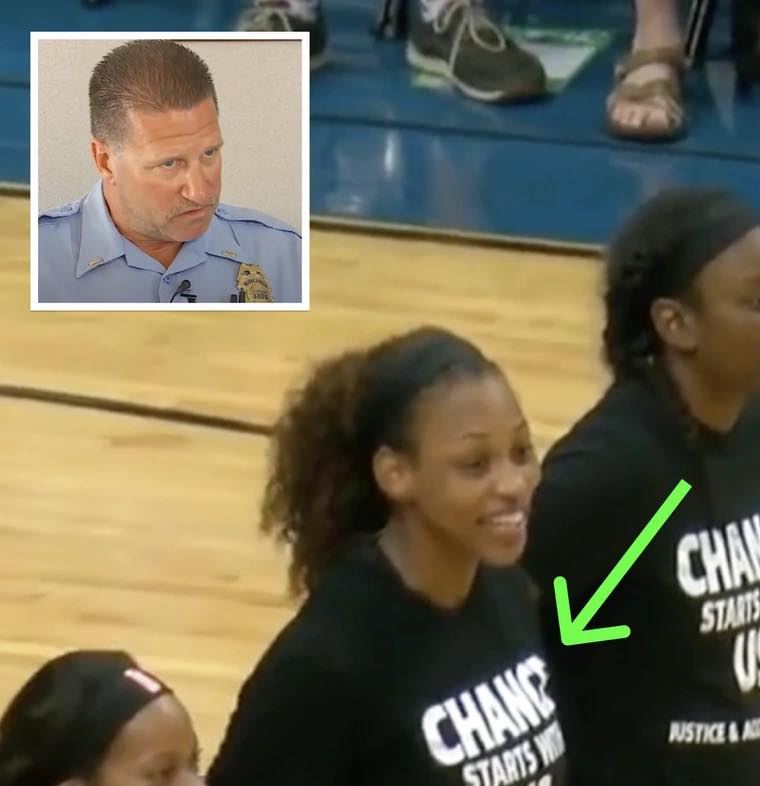The Impact of Athlete Activism: A Reflection on a 2016 Incident
In July 2016, a notable incident unfolded at a WNBA Lynx game that would highlight the tensions surrounding athlete activism and public perceptions of law enforcement. Four off-duty officers from the Minneapolis Police Department, who were employed for security during the game, made headlines when they abandoned their posts in response to the players’ pre-game attire. This reaction was triggered by the Lynx players wearing black T-shirts emblazoned with the names of two black men who had tragically lost their lives due to police violence. One name, Philando Castile, was particularly poignant as he was shot during a routine traffic stop in Minnesota, an event that sparked widespread protests and discussions about racial profiling and police brutality across the nation.
The shirts worn by the players not only displayed the names of the victims but also featured a Dallas police badge on the back in memory of the five police officers who were killed in a shooting incident in Dallas, Texas. The front of the T-shirts bore the phrase “Black Lives Matter,” a slogan that has become synonymous with the movement advocating against systemic racism and police violence. This choice of attire was not merely a fashion statement but a deliberate act meant to provoke thought and provoke dialogue. During a pre-game press conference, Lynx players articulated the significance of their attire, stating their intent was both to honor the deceased and to advocate for meaningful change. Rebekkah Brunson, one of the prominent figures in the discussion, shared a personal narrative about her childhood encounters with police, underscoring the persistent nature of these issues: “What is happening today is not new,” she stated, calling for awareness and action against racial profiling and violence.
The Minneapolis Police Federation quickly responded to the situation, expressing their discontent with the players’ choice of clothing. Officers requested the team officials to ask the players to remove the shirts, citing their discomfort with the message being portrayed. When the Lynx organization refused to comply with the demand, the officers chose to walk off the job, an act that was interpreted as a protest against what they perceived as an anti-police sentiment. Lt. Bob Kroll, president of the police federation, described the shirts as part of a “false narrative” regarding police misconduct, asserting that the players should stick to their roles as athletes rather than engage in political discourse. His comments sparked further controversy, as many interpreted them as an attempt to silence an important social conversation.
The aftermath of the incident showcased how sensitive the topic of athlete activism has become in contemporary society. Minneapolis Police Chief Janeé Harteau publicly acknowledged the frustrations felt by the officers while simultaneously condemning their actions. She emphasized that, despite the officers working in a security capacity for the Lynx, their obligations to uphold the values of the police department should prevail. “Walking off the job and defaulting on their contractual obligation to provide a service to the Lynx does not conform to the expectations held by the public for the uniform these officers wear,” she remarked, highlighting the complexities involved when personal beliefs intersect with professional responsibilities. This duality of duty presents a significant challenge, particularly for those whose public personas are inherently linked to their professions.
The incident also drew strong reactions from local government figures, notably Minneapolis Mayor Betsy Hodges, who took to social media to voice her dissatisfaction with Kroll’s remarks. She stated unequivocally that his opinions did not represent her views and expressed her support for the Lynx players’ right to express themselves. This public display of solidarity from a political figure underscored the growing recognition of athletes as influential voices in the ongoing discourse about race, justice, and equity in America. The mayor’s comments highlighted a shift in perspective, framing athlete activism not merely as a controversial stance but as an essential part of broader societal change. Such endorsements reflect a growing acceptance that the realms of sports and social advocacy are increasingly intertwined.
The fallout from this incident serves as a critical case study in understanding the delicate balance between professional obligations and personal beliefs in the realm of sports. Athletes today are increasingly stepping into the spotlight not just for their athletic prowess, but also as advocates for social justice. As seen in the Lynx incident, this activism can provoke strong reactions from various stakeholders, including fans, law enforcement, and political representatives. The event exemplifies how sports can serve as a platform for raising awareness and fostering dialogue on pressing societal issues, ultimately encouraging a more informed and engaged community. In the broader context, such incidents can lead to significant shifts in public perception, affecting how athletes are viewed not only as entertainers but also as activists.
Furthermore, this incident is part of a larger trend observed across professional sports leagues, where athletes are increasingly using their platforms to speak out on social issues. From NFL players kneeling during the national anthem to NBA teams expressing solidarity with the Black Lives Matter movement, the landscape of sports activism is continually evolving. These actions have sparked both support and backlash, highlighting the risks athletes take when they choose to engage in political discourse. However, the willingness of athletes to confront difficult topics often resonates with younger audiences, fostering a sense of connection and urgency around social justice issues.
In conclusion, the events that transpired during the WNBA Lynx game in 2016 reverberate beyond the court, encapsulating the ongoing struggle for racial justice and the role of public figures in advocating for change. As athletes continue to leverage their platforms for activism, the conversations sparked by incidents like these remain crucial in driving societal progress. The challenge lies in navigating the complex relationship between activism and public service, as well as the expectations placed on both athletes and law enforcement in modern society. Ultimately, the Lynx incident serves as a powerful reminder that sports can be a catalyst for change, urging all of us to reflect on the societal issues at hand and to engage in meaningful discussions that can lead to understanding and action.

















